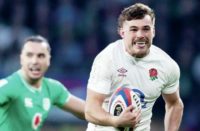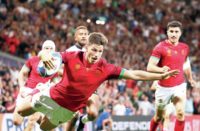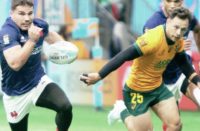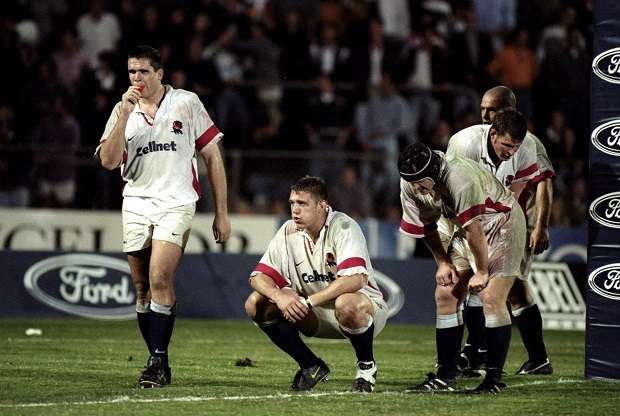 Compared with New Zealand and South Africa, an England trip to Australia is sometimes seen as a ‘softer' tour but the bare statistics don't really back that up. England have tasted victory there only three times in over 50 years and winning an historic first ever three Test series is going to be hellishdifficult.
Compared with New Zealand and South Africa, an England trip to Australia is sometimes seen as a ‘softer' tour but the bare statistics don't really back that up. England have tasted victory there only three times in over 50 years and winning an historic first ever three Test series is going to be hellishdifficult.
England's first Test in Australia was a low key, not to say shambolic, affair in 1963 when they stopped off in Sydney on the way back from a quickfire five-game tour of New Zealand that included two Tests. Less than 72 hours after coming off the pitch at Lancaster Park in Christchurch, unlucky 9-6 losers against the All Blacks after having two late pushover tries disallowed, England were running onto the Sydney Cricket Ground to play Australia.
It was hosing with rain, less than 8,000 fans attended and expectations were low. What unfolded was a classic tale of two halves, Australia scoring four first half tries with the storm at their backs, England gamely hitting back with three of their own after half-time. Australia ran out 18-9 winners and it was another 12 years before England returned to Australia.
The 1975 tour was a controversial and unhappy affair and is chronicled far right on these pages, but the net result was a 2-0 series defeat for England which was again the outcome when England toured 13 years later. Tours Down Under came but once a career in those days.
Outwardly that 1988 tour was another depressing failure. England were beaten in the two Tests, lost to New South Wales and, apart from a good win over Queensland at Ballymore, at no stage really impressed – but the tour did constitute an important sorting of the wheat from the chaff for new coach Geoff Cooke.
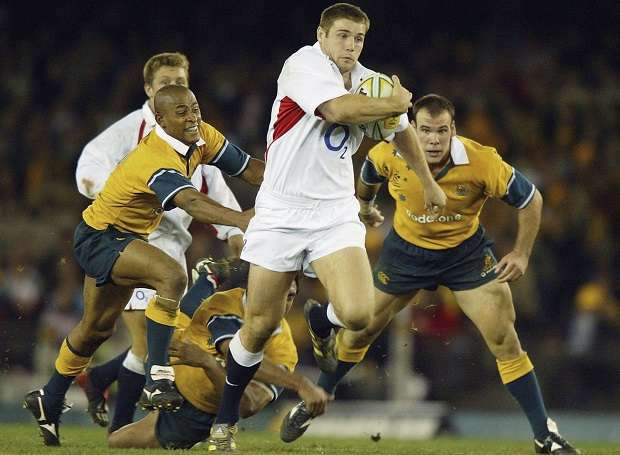 By the time he had returned, Cooke had spotted the individual he wanted captaining his England sides – a young Will Carling, right – and convinced a gnarly pack of forwards – the likes of Brian Moore, Wade Dooley, Mick Skinner, Dean Richards, Paul Rendall and Jeff Probyn – that a new level of fitness was required to play the modern game.
By the time he had returned, Cooke had spotted the individual he wanted captaining his England sides – a young Will Carling, right – and convinced a gnarly pack of forwards – the likes of Brian Moore, Wade Dooley, Mick Skinner, Dean Richards, Paul Rendall and Jeff Probyn – that a new level of fitness was required to play the modern game.
Cooke and England were back in Australia in 1991 for a quickfire six-match Tour taking in Fiji by way of World Cup preparation but although generally going well they got stuffed 40-15 in the Test against the Aussies. The score line was harsh and the general consensus was that although the England pack struggled, on another day the England backs could have scored two or three more tries.
That perception – true or misguided – was important five months later when, come the 1991 World Cup Final against Australia, England went away from the gameplan that had been serving them so well. Suddenly they started to run everything against the Wallabies rather than trust their much improved pack to steamroller the opposition. The debate over that one continues to this day.
England had no chance in the one-off Test in 1997 when half the team were injured and the other half still feeling the effects of an epic farewell party in Johannesburg following the Lions series which finished the previous week. A 17-hour flight didn't help either and England were duly despatched 25-6 but that was positively competitive compared with a year later when Sir Clive Woodward's England were annihilated 76-0 in Brisbane, the first match of the Tour of Hell.
With major players either injured or crying out for a rest Woodward travelled with a hugely experimental squad which was embarking on probably the most arduous tour ever devised by the unthinking money men of the RFU. The result was calamitous with the Australia Test the low point although four or five future World Cup winners emerged from the debris – Josh Lewsey, Jonny Wilkinson, Matt Dawson, Lewis Moody and Phil Vickery.
But 76-0? To this day it's England's biggest ever defeat. It's strange what you remember. Bizarrely England could have been 13-0 up in the first ten minutes with a 19-year-old Jonny Wilkinson, who had toured Australia the previous year with the England Schools team, missing two simple penalty chances and wing Spencer Brown – remember him? – squandering a golden opportunity.
Thereafter it was all one way traffic as a full strength Australian side – basically the Australia team that was to become World Champions – scored 11 tries with hat-tricks for Stephen Larkham and Ben Tune. Painful barely does it justice.
Playing Australia in Australia, one way or another loomed large for Woodward's England. In 1999 there was a much more encouraging one-off Test performance when they lot 22-15 in Sydney in a match essentially tagged on to England's summer fitness camp but, of course, it was 2003 when all the hard yards paid off, above.
First came the deliberate upping of the ante and the decision to take a full strength squad, albeit jaded from a long season, down to New Zealand and Australia to maintain England's positon as the number one ranking team in the world and to finally get a massive monkey off their back, namely a first Test win on Australia soil.
The latter came gloriously with a deeply impressive 25-14 win over Australia at the Telstra Dome in Melbourne when England played Rugby from the Gods for 40 minutes before shutting down the engine after half-time, as if to say it's all about the World Cup now.
Woodward had landed a notable psychological blow ahead of the match by surprising Aussie coach Eddie Jones with his insistence that England wanted the roof closed so that the best “rugby playing” team would win. It's always the away team's call on these occasions and the Aussies had fully expected England to want the roof open to the vagaries of the Melbourne climate.
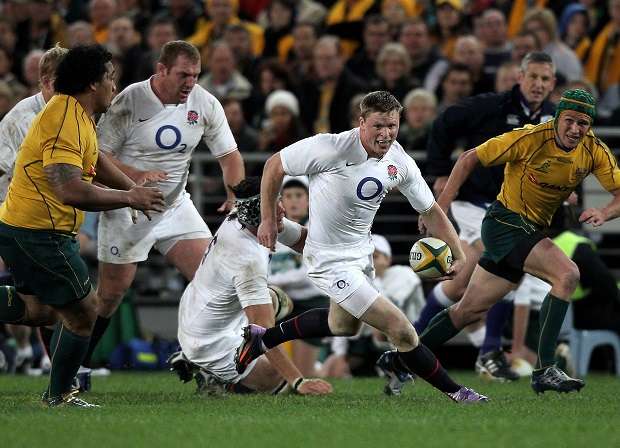 “That tour and that win in Australia in particular were big moments,” recalls Woodward. “It would have been very easy after winning the 2003 Grand Slam in good style to rest up that summer but I didn't think that was the right preparation for a World Cup in Australia. I wanted us to hit the ground running as the undisputed number one team in the world and to earn that status you have to win Test matches in New Zealand and Australia. England had never won in Australia and we definitely had to get that monkey off our back.
“That tour and that win in Australia in particular were big moments,” recalls Woodward. “It would have been very easy after winning the 2003 Grand Slam in good style to rest up that summer but I didn't think that was the right preparation for a World Cup in Australia. I wanted us to hit the ground running as the undisputed number one team in the world and to earn that status you have to win Test matches in New Zealand and Australia. England had never won in Australia and we definitely had to get that monkey off our back.
“In pure rugby terms the first 40 minutes we produced against Australia in Melbourne was as good as it gets. We saw a great team hitting its peak and playing some unbelievable rugby against a very good Australian side. We walked off the pitch that night knowing that the World Cup was absolutely within our compass.”
Having got that first win Down Under England went on to even greater things. Australia were much more competitive in the World Cup, however, and pressed England all the way before Wilkinson, another for whom trips to Australia helped stage post his career, did the business with his drop-goal. Forty years without a win in Australia and now two in five months.
Sport is fickle, though, and for all his success in Australia, Woodward's England career also effectively came to an end there with a 51-15 defeat in Brisbane seven months later, although it was the behind-the-scenes politics at the RFU in the summer of 2004 and their refusal to accept Woodward's proposed changes to the England set-up that really did for him.
World Cup-winning England were out on their feet by June 2004 but yet again a lucrative three-Test tour of New Zealand and Australia had been arranged by way of ‘relaxation'. After New Zealand had softened them up with two convincing wins, it was the Aussies who worked off their World Cup frustrations with a cracking performance as England finally hit the wall.
Since then there has been just one England win in Australia to put alongside Woodward's brace, a curiously unheralded affair by Martin Johnson's young team in the summer of 2010, above. It has become fashionable to rubbish everything that happened on Johnson's watch, but England actually did the double over Australia in 2010 if you include their spectacular win at Twickenham in the autumn and won ten of their 13 matches in 2011 before Johnson was hounded out of office.
Their 21-20 win in Australia was a good one with two of England's young players displaying their Test credentials. Ben Youngs showed startling speed at scrum-half to score his try and Chris Ashton demonstrated his instinctive try-poachers touch to score his first international try.


